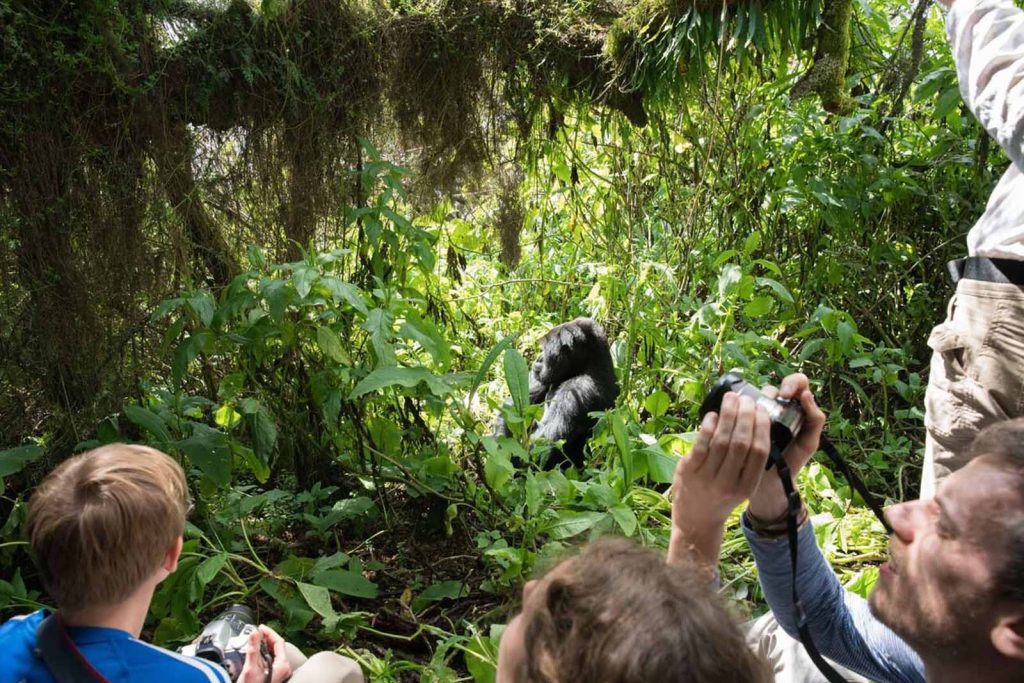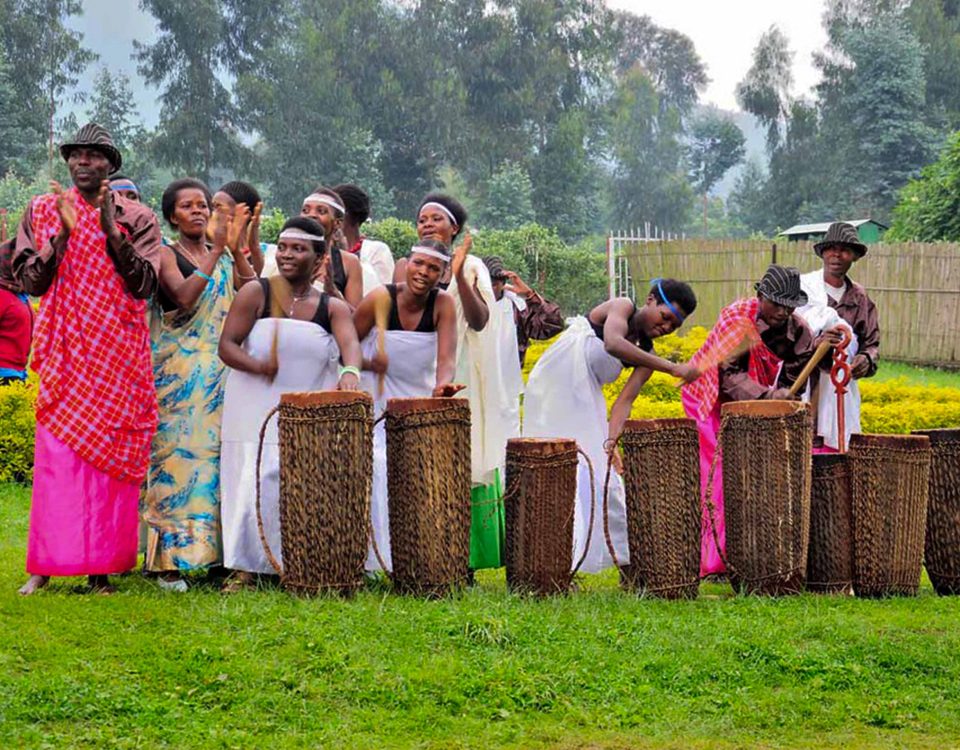The Majestic Mountain Gorillas
In the misty heart of East Africa’s volcanic mountains lives a mysterious gentle giant – the mountain gorilla. Their powerful frames, covered in thick black fur, and expressive, deep-set eyes betray a striking resemblance to our own ancestry. These magnificent creatures find sanctuary within protected rainforests, where lush vegetation and the rugged terrain provide a haven for their families. Witnessing them in their natural habitat is a life-changing experience, and for those with an adventurous spirit, guided treks offer the rare opportunity to spend an unforgettable hour observing these majestic primates in the wild.
Behavior and Social Structure
Mountain gorillas are known for their gentle nature and intricate social hierarchies within their groups. Their daily routines often involve foraging for vegetation and engaging in social interactions that reflect their close-knit communities.
Africa’s gentle giants live in tight-knit family groups led by a dominant silverback male, responsible for protecting his troop of females and young. Within this structure, strong bonds form, displayed through gentle grooming, playful interactions, and shared nesting. Their largely peaceful nature is evident in their foraging habits, primarily focused on consuming a vegetarian diet. While displays of strength, such as chest beating, can occur to assert dominance or ward off threats, these magnificent creatures embody a sense of tranquility and intelligence that captivates observers.

Threats to Mountain Gorillas and Conservation Efforts
Despite their immense power, mountain gorillas face a fragile existence. Habitat loss due to deforestation, human encroachment, and the devastating effects of poaching and snares pose significant threats to their survival. Thankfully, dedicated conservation efforts tirelessly work to protect these endangered apes. Anti-poaching patrols, habitat restoration initiatives, and community-based programs aimed at reducing human-wildlife conflict are crucial for safeguarding the future of mountain gorillas.
Responsible tourism practices, like carefully regulated gorilla trekking, contribute to conservation efforts by raising awareness and generating funds to support their protection.
Significance of Gorilla Tourism in Conservation
Gorilla tourism serves as a vital tool for the conservation of these endangered primates. The revenue generated from carefully controlled gorilla trekking permits provides critical funding for park management, anti-poaching efforts, and community development projects. T
The presence of tourists and researchers also acts as a deterrent to illegal activities within protected areas. Moreover, gorilla tourism fosters a greater understanding and appreciation for these magnificent creatures, inspiring a worldwide commitment to their protection.
Gorilla tourism offers local communities a sustainable livelihood and encourages their active participation in conservation initiatives. This ensures a brighter future for both the gorillas and the people who share their habitat.

Gorilla Trekking Safaris in Uganda
Gorilla safaris in Uganda take visitors to the mountain jungles of Bwindi Impenetrable National Park and Mgahinga Gorilla National Park. However, because of Uganda’s varied wildlife attractions, gorilla safari packages usually extend into savannah game parks like Queen Elizabeth, Lake Mburo, and Murchison Falls National Park.
Bwindi Impenetrable National Park, a UNESCO World Heritage Site, is the primary attraction on gorilla safaris in Uganda. The sanctuary is a crucial gorilla habitat with pristine rainforests that provide a home to nearly half of the world’s mountain gorilla population.
Uganda Gorilla Permits and Regulations
To participate in gorilla trekking excursions in Uganda, travelers need to obtain a gorilla trekking permit, which helps regulate visitor numbers and minimize disturbance to the gorillas.
The Uganda permit costs $800 per person, and you can get it from Uganda Wildlife Authority offices or through a licensed tour operator like Mahanda Safaris. You must book your permit before planning your entire gorilla safari because they are scarce and will determine which part of the park you should book your accommodation.
Uganda Gorilla Trekking Trails and Difficulty Levels
Bwindi offers several trekking trails, each varying in difficulty and duration. The treks range from relatively easy to challenging, catering to different fitness levels and preferences.
The easiest treks are in the Buhoma Sector north of the park, with relative hikes in the northwest in the Ruhija Sector. Rushaga and Nkuringo Sector are for seasoned hikers who prefer a more challenging experience through the undulating landscape. The sectors are quite miles apart, requiring you to book accommodation in the sector indicated on your trekking permit.
Accommodations and Nearby Attractions
Numerous lodges and campsites are available near Bwindi and Mgahinga, providing comfortable stays for visitors. Additionally, nearby attractions, such as local communities and wildlife, offer added experiences.
Top accommodations for gorilla safaris in Uganda include:
- Sanctuary Gorilla Forest Camp (luxury)
- Buhoma Lodge (luxury)
- Nkuringo Bwindi Gorilla Lodge (luxury)
- Clouds Mountain Gorilla Lodge (luxury)
- Bwindi Lodge (luxury)
- Mahogany Springs Lodge (mid-range)
- Buhoma Community Haven Lodge (budget)
- Four Gorillas Lodge (mid-range)
- Chameleon Hill Lodge (Mid-range)
- Mutanda Lake Resort (mid-range)
- Rushaga Gorilla Lodge (mid-range)
- Mount Gahinga Lodge (Luxury)
- Silverback Gorilla Lodge (Mid-range)

Gorilla Safaris in Rwanda
Gorilla trekking safaris in Rwanda take place in Volcanoes National Park. This mountainous forest park, part of the Virunga Massif, is renowned for its gorilla populations and stunning volcanic landscapes. It’s a prime destination for gorilla trekking tours in Rwanda. The park is a 3-hour drive from Kigali International Airport on a smoothly surfaced access road.
Apart from gorilla trekking, Volcanoes offers other captivating attractions like trekking the endangered golden monkeys native to the Virungas and nature hiking, especially to Diane Fossy’s resting place. However, to access the park, you must obtain a trekking permit from the Rwanda Development Board (RDB).
Rwanda Gorilla Permits and Regulations
Similar to Uganda, obtaining a gorilla trekking permit in Rwanda is mandatory for visitors to Volcanoes National Park, ensuring sustainable tourism practices. The permit in Rwanda costs $ 1,500 per person. The permits are provided by RDB, and you can book them yourself online or through a licensed tour operator, which gives you an advantage over the annoying local logistics in case you want to change your travel plans.
Rwanda Gorilla Trekking Trails and Difficulty Levels
The trekking trails in Volcanoes National Park vary in difficulty, considering the weather and the location of the gorilla group you will be trekking on D-day. Some gorilla groups can be far from the park entrances, and the trek can be physically demanding. On the other hand, some gorilla groups are pretty close to the park entrance.
Compared to Uganda, the gorilla trekking experience in Rwanda is less physically demanding because the park has less vegetation and is easy to access from the airport. However, both countries offer incredible experiences through breathtaking scenery and a chance to witness the gorillas in their natural habitat.
Accommodations and Nearby Attractions
Numerous accommodation options are available around Volcanoes National Park, providing a range of choices to suit various budgets and preferences during gorilla safaris in Rwanda. Travelers can also explore nearby attractions and engage with local communities.
Popular accommodation for gorilla safaris in Rwanda include:
- Bisate Lodge (luxury)
- One&Only Gorilla’s Nest (luxury)
- Singita Kwitonda Lodge (luxury)
- Sabyinyo Silverback Lodge (luxury)
- Volcanoes Virunga Lodge (luxury)
- Five Volcanoes Boutique Hotel (mid-range)
- Amakoro Songa Lodge (mid-range)
- Mountain Gorilla View Lodge (mid-range)
- Davinci Gorilla Lodge (budget)
- Lebambou Gorilla Lodge (budget)

Preparing for Your Gorilla Safari
Essential Items and Packing List for a Gorilla Safari: Packing appropriately is crucial for a successful gorilla safari. Essentials include:
- Sturdy hiking boots.
- Rain gear.
- Insect repellent.
- A good-quality camera.
- Appropriate clothing for varying weather conditions.
For you: What to pack for the gorilla trekking adventure
Fitness and Health Considerations for Gorilla Trekking: Gorilla trekking can be physically demanding, necessitating a reasonable fitness level. Prior conditioning, a health check-up, and consulting a healthcare professional for any necessary vaccinations or health advice are recommended.
Tips for a Successful and Respectful Gorilla Safari Experience: Respecting gorillas and their habitat is paramount. Visitors should adhere to guidelines provided by park rangers, maintain a safe distance from the gorillas, minimize noise, and follow all regulations to ensure a positive and respectful experience.

The Importance of Responsible Gorilla Tourism
Responsible gorilla tourism involves supporting conservation initiatives, respecting the wildlife and its habitat, and minimizing negative impacts to ensure a sustainable and enduring experience for future generations.
Travelers can actively contribute to gorilla conservation by donating to reputable organizations, participating in community-based conservation projects, or directly supporting initiatives to protect the gorillas and their habitats.
Travelers should strive to minimize their ecological footprint by following established guidelines, using eco-friendly products, conserving water and energy, and practicing responsible waste disposal during their safari.
Engaging with Local Communities and Projects
Engagement with local communities and projects is an enriching aspect of responsible tourism. Travelers can learn about local cultures, traditions, and sustainable practices, fostering a deeper appreciation for the regions they visit.
Embarking on a gorilla safari in Uganda or Rwanda promises a once-in-a-lifetime adventure, immersing travelers in the awe-inspiring world of mountain gorillas. By choosing responsible tourism, visitors not only enrich their lives with unforgettable experiences but also contribute to the vital conservation of these magnificent creatures and their habitats. Plan your journey, pack responsibly, and step into a world where nature and humanity harmoniously coexist.




